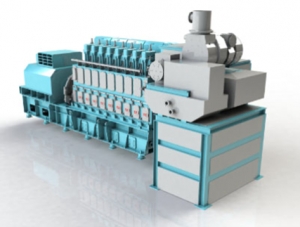


(Posted on 01/12/22)
ClassNK has issued an Approval in Principle (AiP) for a dual fuel generator engine using hydrogen gas as fuel and related machinery systems and arrangements for a 160,000m3 liquefied hydrogen carrier developed by Kawasaki Heavy Industries, Ltd. (KHI). This marks ClassNK's first AiP for a dual fuel generator engine using hydrogen gas as fuel.
As hydrogen is expected to be used as a clean energy source to realize a decarbonized society, ClassNK has worked on the establishment of necessary standards and certification to contribute to its maritime transportation and marine fuel use. For the 160,000m3 liquefied hydrogen carrier developed by KHI, ClassNK has so far issued AiPs for its integrated design as well as its Cargo Containment System (CCS), Cargo Handling Systems (CHS), and dual fuel main boilers that use hydrogen boil-off gas as fuel.
In the latest examination, ClassNK carried out the design review of the dual fuel generator engines using hydrogen gas as fuel and related machinery systems and arrangements based on its Part N of Rules for the Survey and Construction of Steel Ships incorporating the IGC Code, and its Guidelines for Liquefied Hydrogen Carriers incorporating the IMO’s interim recommendations for Carriage of Liquefied Hydrogen in Bulk. In addition, a comprehensive safety assessment was conducted based on the HAZID risk assessment results, which has led to the issuance of the AiP
According to KHI, the dual fuel generator engine is capable of switching between hydrogen and low-sulfur fuel oil flexibly, and when hydrogen fuel is selected, boil-off gas naturally evaporated from the ship's liquefied hydrogen cargo tanks is used as the main fuel at a calorie - based mixed ratio of 95% or higher to generate and supply electricity in board, which is expected to reduce greenhouse gas emissions from the ship significantly.
ClassNK will actively continue to take part in advanced initiatives toward decarbonization and also support the decarbonization of the entire maritime industry by incorporating the knowledge gained through collaboration with front runners into rules and guidelines.
At the initial stage of designing or before the specific target ship etc. to be implemented is decided, the design is examined based on the existing regulations such as international treaties and ship classification rules, and an Approval in Principle (AiP) is issued as proof of conformity with requirements. It also prevents rework of regulatory aspects in the post-process, shortens the examination time at the time of class registration, and can be used as a technical basis for external appeal of the design status.
Alfa Laval has completed the acquisition of UK-based NRG Marine, a leading provider of ultrasonic anti... Read more
In a landmark moment for the global maritime industry, the Maritime Battery Forum (MBF) and the Zero... Read more
Bruks Siwertell Group has announced a leadership transition as Peter Jonsson steps down as CEO after... Read more
ClassNK has issued an approval in principle (AiP) for a Rigid Windsail Type Wind-Assisted Propulsion... Read more
Elcome International’s new high-speed internet service, WELCOME, is revolutionising the way ship... Read more
Kaiko Systems, a leader in AI-driven frontline intelligence for the maritime industry, today announced... Read more
Marcegaglia’s latest acquisition, the LHM 600, marks a significant milestone as the 2,000th mobile... Read more
The Isle of Man Ship Registry (IOMSR) is playing a key role in the development of a high-tech sail aimed... Read more
AtoB@C Shipping, subsidiary of ESL Shipping, has taken delivery of Terramar in Goa, India on 14 March... Read more
As a new strategy period commences, VIKING Life-Saving Equipment A/S has achieved strong financial results... Read more